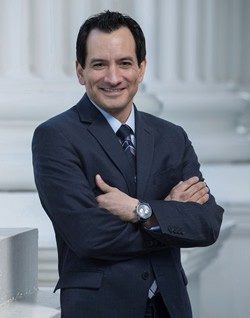Last Friday, California Assembly Speaker Anthony Rendon (D-Lakewood) announced that he was hitting the pause button on SB 562, a bill to establish a single-payer health care system in California, holding it in the Rules committee until further notice.
To justify this bold choice, Rendon issued a public statement that indicates while he, in theory, supports single-payer, he’d rather see anyone but the California State Assembly take on the details.

Making Congress irrelevant
Enacting single-payer would make Congressional meddling with the Affordable Care Act largely irrelevant to the average Californian, allowing us to stop living in fear of the U.S. Senate and move on with our lives.
This fits in with the California Freedom Coalition’s general approach to the federal government; it’s why endorsed SB 562, and why we filed an initiative which, among other things, asks state officials:
…to buffer Californians against chaos, dysfunction, and uncertainty at the federal level.
Rendon certainly gets this; in his statement, he says:
Yesterday, Republicans in the U.S. Senate released a cynical plan to repeal the Affordable Care Act, posing a real and immediate threat to millions of Californians who only have health coverage because of the ACA.
Preparing California to meet this threat must be the top health care priority for the Legislature, Governor Brown, and organizations that advocate for increasing access to health care.
Needs more legislation
As it stands SB 562 is only halfway done; as Rendon puts it, the bill does not address:
…many serious issues, such as financing, delivery of care, cost controls, or the realities of needed action by the Trump Administration
I think everyone involved in the process gets this; by passing a partial bill, Senators could gauge public support and energize supporters, and then withthat support, fill in the details.
I think they also get that this bill will never take effect without a legislative supermajority, both because a new funding source (taxes) would be needed to replace what Californians currently pay in premiums, deductibles, and co-pays, and because it might be necessary to override a gubernatorial veto.
And the hard part here is politics, not policy, This study lays out a menu of funding sources and cost controls; what we need is politicians that are coordinated and brave enough to choose off the menu.
Can’t the Senate do it?
Rendon makes it abundantly clear that wherever these brave and coordinated politicians are, we shouldn’t look for them in the Assembly. First, he blames the Senate for putting him on the spot:
…SB 562 was sent to the Assembly woefully incomplete. Even senators who voted for SB 562 noted there are potentially fatal flaws in the bill…
and then kicks the can back to them:
Because this is the first year of a two-year session, this action does not mean SB 562 is dead. In fact, it leaves open the exact deep discussion and debate the senators who voted for SB 562 repeatedly said is needed.
“The Senate can use that time to fill the holes in SB 562 and pass and send to the Assembly workable legislation that addresses financing, delivery of care, and cost control.
Timing matters
Note the timing on this. Because of the way the legislative calendar works, the Senate’s work on this bill is done for this year until the Assembly sends it back. No Senate committee can consider the bill or conduct public hearings. Any “deep discussion” is necessarily going to take place behind closed doors, between Senators, staff members, and lobbyists.
In contrast, the Assembly still has the ability to run the bill through the public process this year. The Rules committee (where Rendon has currently stalled the bill) and two other committees would need to hold public hearings and propose amendments before the bill could reach the Assembly floor for a vote.
Can’t you guys just do it by initiative?
Where Speaker Rendon’s statement gets really weird is here:
The head of the Campaign for a Healthy California, an organization created to pass SB 562, has acknowledged their ultimate goal is to get a single payer initiative on the ballot, and there remains ample time for them to pursue that before November 2018.
The initiative system has one strength that the legislature does not: to pass a tax increase, you only need a majority of voters, not a supermajority of legislators.
But it has a ton of weaknesses. Having helped draft an initiative myself, I can tell you that it’s almost by definition a closed-door, backroom process. And for something as complicated as a health-care system, you want the legislature to be able to make fixes, but whether they’re allowed to do that (without going back to the voters) is totally up to the initiative’s drafters. Friendly drafters, like us, defer to elected officials as much as possible, to ward off any unintended consequences. Others do not.
And then there’s the timing issue. According to the California Secretary of State, if you want an initiative on the November 2018 ballot, you’d better file no later than August 22, 2017.
If Assembly committees were allowed to hold hearings on SB 562, they could, in theory, hold all of them before that date, giving the Assembly and the public at least some opportunity to influence the content of the initiative.
But if the legislature has to hold off until next year… we get whatever initiative we get.
We believe in you, Assembly!
Health care is both important and urgent; it certainly deserves the attention of the State Assembly this year. If, at the end of this process, we get a bill that can’t muster supermajority support, and instead becomes the raw material for an initiative or a new bill introduced next year, we’ll be no worse off than we are now.
And the Assembly deserves leadership that believes it has something to contribute to this debate. If Anthony Rendon doesn’t believe in the Assembly’s ability to take on hard problems, why should anyone else?
This article originally appeared in California Rising.
